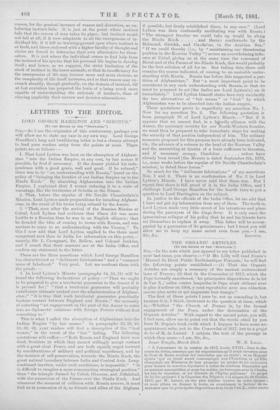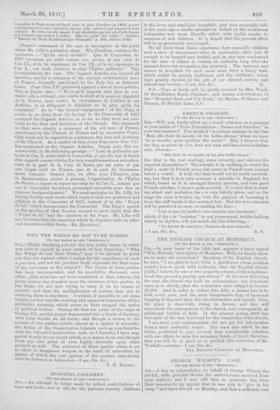THE ORGANIC ARTICLES.
(TO THE EDITOR OF THE "SPECTATOR.")
SI the note which you append to my letter published iu your last issue, you observe :—" If Mr. Lilly will read Dupin's Manuel du Droit Public Eccl6siastique Francais,' he will find the following points established :—(1) That the Organic Articles are simply a summary of the ancient ecclesiastical laws of France; (2) that in the Concordat of 1817, which the Pope formally sanctioned, les principales dispositions do la loi
de l'au X.,' cellos contro lesquelles le Pape avait r6clam6 avec le plus d'ardenr en 1804, y soot reproduites avec une redaction
encore plus nette et qui augmente leur energie."
The first of these points I pass by, not as conceding it, but because it is, I think, irrelevant to the question at issue, which is,—Whether " the Church of France is, by the formal engagement of the Pope, under the domination of the Organic Articles." With regard to the second point, you will,
I feel sure, allow me to point out that the words cited by you from M. Dupin's book (with which I happen to have some ac- quaintance) refer, not to the Concordat of 1817, but to a, projet do loi of M. do Laisn6. I subjoin the text of the passage in
which they occur.—I am, Sir, &c.,
inner Temple, March 23rd. W. S. LILLY.
" A l'ouverture do la session de 1817, Louis XVIII., dans le die- cou rs du troll°, antion9a quo lee negooiations qu'il avait ouvortes avec la Cour do Rome avaient Gt6 tormineos par un traits ; ot en Majost6 ajonta ' quo co traitG serait communiqué aux Chambres, et qu'Ello charger-aft ses Ministres do lour proposer un projet do loi necessaire pour dormer la sanction lcsgislative 1 cellos du nouveau Concordat qui en seraient susceptibles, of pour les in ettro on harmonie avec In Charts, les lois On royaurno, ot les libortos do l'flgliso gallicano.' Co projet do loi fat pr6sentd h la Chambro des D6putes h Is séance du 28 fevrier, 1817, par M. Laisn6, un dos plus habiles /egistes de cetto 6poque ; et antis allons en donner le texte, en avertissant In lectern do re- m arquer quo les principales dispositions de la loi de l'on X., cedes contra rtosqueUes /a 'Pape avait re'ciamd avec Is plus d'ardeur on 1801, y emit raproduites,avec was redaction encore plus nette et qui augments lear 4nergie. Si cotto loi edt pass6, it est probable qua lea n6o.eatboliques say eussent pas trouv6 a redire. Elle n'n. point 41.4 vot6e."—Dnpin's
Manuel du DrOit Ecol6siastique Francais," p. 505, edition 1815.
[Dupin's statement of the case is incomplete at the point
where Mr. Lilly's quotation stops. We, therefore, continue the quotation :—" Qu'en est-il result6 ? Quo le Concordat de
1817 lui-mome est rest4 comme non, avenu, of quo colui de Tan IX., et la loi organique do l'an IX., et in loi organique do Wan X., out souls centimes de regir l'Eglise gallicaue." This is undoubtedly the case. The Organic Articles are, beyond all
question, merely a summary of the ancient ecclesiastical laws 'of Frauce, formally sanctioned by the Holy See at different :times. Pope Pius VII. protested against a few of those articles.
.But, as Dupin says :—" Et co qu'il import° bien plus de con- stater, elle a Helaine, non centre le droit of le pouvoir• Idgislatif ale in France, mais centre la convonance et Putilite de ces
Articles, et on alleguant le deplaisir ou la gone qu'ils lui .,causaient." As to " the formal engagement " of the Pope, it -'seems to us clear, from his having in the Concordat of 1817
Atecepted the Organic Articles, in so far as they were not con- trary to the laws and doctrines of the Church. But inasmuch as they were simply a summary of the old laws of France, sanctioned by the Church of France and by successive Popes, • they could not be regarded as contrary to the laws and doctrines of the Church. As a matter of fact, every Pope since Pius VII. Ias acquiesced in the Organic Articles. Dupin puts this un- answerably, in the following passage :—" Loin de pretendre que da loi de l'an X. avait viols le Concordat, et que des lore it devait 'etre regards comma resolu,i1 a rep completement son execution,
%tont de Is part de la Cour do Rome, par see actes et par ,son. L6gat rusts en France, que do in part du Gonverne- ment francais. Depuis lora, en effet, sous l'Empiro, sous a Restauration, encore it. present, l'organisation de l'Eglise de France a repose et repose Bur cette loi de l'an X., autant que ',Bur le Concordat lui-moue, promulg6s ensemble pour etre en
smigueur inseparablement." We must apologise to Mr. Lilly for
having hastily used words which implied that our quotation had '.relation to the Concordat of 1817, instead of to the " Projet de loi" which incorporated the Concordat. The King's speech M the opening of that Session seemed to us to imply that .the Projet de lei" had the sanction of the Pope. Mr. Lilly will
see, however, that the assertion which he disputes rests on other And incontrovertible facts.—ED. Spectator.]



































 Previous page
Previous page